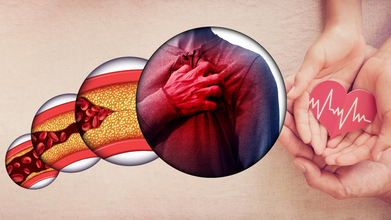- Health Conditions A-Z
- Health & Wellness
- Nutrition
- Fitness
- Health News
- Ayurveda
- Videos
- Medicine A-Z
- Parenting
- Web Stories
Simple Test Done At Age 7 Can Predict How Long You Live: Study Reveals The Risk Of Early Death Due To Cardiovascular Diseases

A new study has found that a single blood pressure reading taken when a person is just 7 years old can have a surprisingly big impact on their risk of dying from cardiovascular disease (CVD), or heart problems, many years later. Researchers from different US universities discovered that children with high blood pressure faced a significantly greater chance of an early death because of heart issues. This finding tells us that screening children's health early is extremely important.
The study, published in the medical journal JAMA, highlights how important early health screenings are by showing a clear connection between a child's blood pressure and their long-term health outcome. Children who had elevated blood pressure, meaning it was higher than normal, in the top 10 percent of kids or high blood pressure, in the top 5 percent were about 40 to 50 percent more likely to meet an early death from heart and blood vessel disease. That's a huge jump in risk.
How Can Blood Pressure Predict How Long You Live?
Researchers explained that they were shocked to find out how elevated blood pressure could affect children later on in life. This means that this shows that health problems start much earlier than previously thought.
The team looked at medical records for 37,081 children born in the US between 1959 and 1965, specifically checking their blood pressure at age 7. They checked back in with these people in their early fifties. Out of this large group, nearly 500 people had died from cardiovascular diseases.
While the total number of people who died from heart-related issues in the study was small, the dramatic increase in risk for the group with high blood pressure was a very important finding that deserves attention.
How Does High Blood Pressure in Childhood Affect Mortality Rate?
There are a few things to keep in mind about this research. The biggest is that blood pressure was only measured once at age 7, not checked regularly throughout the people's lives. Also, the data comes from the 1950s and 1960s, so today's children might have different health challenges.
The researchers also looked at a smaller group of 359 people from the same families. Since the results were similar for children in the same households, it suggests that the high blood pressure itself is the main problem, rather than other things families share like diet or neighborhood.
Besides heart disease, high blood pressure can cause other serious problems like kidney disease, vision loss, and plaque buildup in the arteries. These results "highlight the importance of screening for blood pressure in childhood and focusing on strategies to promote optimal cardiovascular health beginning in childhood," Freedman concluded.
What Causes High Blood Pressure In Children?
High blood pressure (hypertension) in children and teenagers can happen for a few different reasons. Sometimes it's caused by lifestyle factors, and other times it's a side effect of another medical condition.
- If high blood pressure runs in the family, a child is more likely to develop it.
- Being overweight or obese significantly increases the risk.
- Black children are at a higher risk for high blood pressure, just as Black adults are.
- Eating too much salt (sodium) or too many calories can contribute to the problem.
- Having diabetes is a risk factor.
- Being born with a low birth weight or being born prematurely (too early).
- Disorders of the kidneys or problems with the heart or blood vessels.
- Certain hormonal disorders.
- Sleep apnea, a condition where breathing stops and starts during sleep.
According To Doctor, People Regularly Ignore These 3 Key Leg Symptoms, 'You Are Your Own Worst Enemy'

(Credit-Canva)
It is very easy for people to miss signs of declining health. However, many times, despite witnessing the symptoms, people choose to ignore it and hope that it goes away. But one must understand, even for illnesses like a simple fever, one needs some type of treatment, even if it is simply rest. Ignoring your health will only lead to worse problems in the future.
One such aspect of health that people often ignore is their leg health. In a recently posted video, Dr. Rema Malik, a Board-Certified Vascular Surgeon in Houston, explained that people often ignore their leg health, the title of the video being, “You Are Your Worst Enemy When It Comes To Your Leg Health.”
The surgeon highlights a pattern of self-sabotage where people frequently ignore or downplay signals from their legs, which can indicate serious circulation problems.
3 Key Symptoms of Declining Leg Health
According to the surgeon, people become their own worst enemy by creating "normal" excuses for symptoms that are actually abnormal. This dismissal stems from the fear of facing a potential circulation issue. The surgeon points out common examples of how people brush off serious signs:
Calf Cramps: Dismissing a recurring, nagging calf cramp as merely a "charley horse."
Swelling: Attributing swollen ankles at night to simply being "on your feet a lot today."
Varicose Veins: Choosing to hide new, painful varicose veins instead of finding out the underlying cause.
The surgeon stresses that while it feels easier to ignore the "whisper from the legs," the moment a person stops making excuses, they become their own best advocate for a future of easy mobility and freedom.
Why Is Leg Health Important?
According to a 2016 study published in the Journal of Nutrition, Health & Aging, the strength and quickness of leg muscles (leg power) are connected to common long-term health problems in older adults, specifically osteoarthritis (joint pain), diabetes, and cardiovascular disease (heart problems).
The main goal was to see what current research says about how these diseases affect leg power, especially since research suggests that older people with these conditions can improve their leg power through exercise.
The team ended up analyzing 16 studies in total: 5 on osteoarthritis, 5 on diabetes, and 6 on heart disease.
Most studies suggested the same thing: older adults with these chronic diseases generally have lower leg power compared to those who don't have the diseases.
The existing research generally shows that osteoarthritis, diabetes, and heart disease are connected to weaker leg power in older adults.
However, scientists can't make strong conclusions yet because the studies reviewed were too different and didn't use the same ways to measure leg power.
Why You Shouldn’t Dismiss Leg Symptoms Especially After 40?
This pattern of ignoring leg symptoms is risky at any age, but the stakes are significantly raised for individuals over the age of 40.
After 40, the risk of developing progressive vein disease and Peripheral Artery Disease (PAD) increases exponentially. These conditions involve serious circulation problems that worsen over time if left untreated.
The surgeon encourages individuals to shine a light on any leg symptom they have been ignoring.
'This 1 Thing Is Silently Destroying Your Heart' Cardiologist Reveals The Hidden Risk Within Drinks, Snacks And Sauces

Although we may not realize, many times the food we eat has hidden additives. Things that make the food taste good as well as addictive. In a recent video, a cardiologist is trying to warn people, asking them to check the labels behind their packaged food.
Dmitry Yaranov, a cardiologist based in Memphis, Tennessee, is trying to warn people that cardiovascular disease (CVD) isn't just caused by bad cholesterol. In a video posted on Instagram, he explained that there's a very common ingredient that's hidden everywhere—in sodas, snacks, sauces, and even foods that claim to be "healthy." This ingredient is a huge danger to your heart and is the main reason why people get diabetes. That dangerous ingredient is sugar.
How Sugar Slowly Increases Your Risk Of CVD?
Dr. Yaranov points to solid research that proves there is a strong link between eating sugar every day and having a much higher chance of getting heart disease.
Daily Servings
The risk goes up just by eating one serving of something sugary (like a soda or a candy bar) each day. That single serving is linked to an 18% higher risk of heart disease. If you have two or more servings a day, the risk jumps to 21% higher. This is a big deal, and the risk was found even in people who regularly exercise.
Processed Foods Link
A study from 2025 showed that eating a lot of sugar, especially the sugar found in ultra-processed foods (packaged snacks, ready meals, etc.), raises your risk for heart disease by 17%, increases the risk of blocked heart arteries by 23%, and raises the risk of stroke by 9%.
Global Impact
The problem is massive worldwide. High sugar eating is responsible for over 1 million new heart disease cases and 2.2 million new cases of Type 2 diabetes in just one year.
Mortality (Risk of Death)
The doctor also mentions a study that found people who got 25% or more of their total daily calories from sugar had more than double the risk of dying from heart disease compared to people who kept their sugar intake low (under 10% of total calories).
How Does Sugar Harm Your Body?
The cardiologist explains that sugar does more than just add unneeded calories; it actually attacks the healthy systems in your body that look after your heart and how your body uses energy.
- It causes inflammation (swelling and irritation) throughout the body.
- It causes your blood pressure to go up.
- It makes your cholesterol levels worse.
It messes up your blood sugar control, making it hard for your body to manage energy. This is a "double hit" because it harms both your heart and your pancreas (the organ that makes insulin).
How Much Sugar Can You Eat?
To help protect your health, the cardiologist advises everyone to follow the simple rules for sugar set by the American Heart Association (AHA):
Women: Should eat no more than 6 teaspoons of added sugar per day, about 100 calories worth.
Men: Should eat no more than 9 teaspoons of added sugar per day, about 150 calories worth.
The big issue is that most people eat two or three times these recommended limits without even knowing it because sugar is hidden in so many foods. The doctor strongly urges everyone to start checking food labels carefully and actively working to limit their sugar intake to keep their heart strong and their blood sugar stable.
10 Things We Have Normalized In Teen Girls' Health, According To Gynecologist

Society often teaches people to expect mood swings, cramps, and general chaos when girls enter puberty. However, a healthcare professional suggests that this perspective may be causing people to miss important warning signs about a teen girl's overall health and well-being.
In an Instagram post, Holly Miller, OB/GYN (obstetrician and gynecologist) listed the things people often overlook when it comes to women’s health. The core message is that people should stop accepting certain struggles as "normal" and instead consider them as potential reasons to investigate deeper.
10 Ways People Often Dismiss Teen Girls’ Health
In the post caption, Dr Holly detailed 10 different things that people have normalized teen girls and their health concerns.
"She’s just moody."
Don't simply blame hormones; constant moodiness could point to serious mental health issues like anxiety, depression, or even PMDD. These conditions require professional support and should not be ignored.
"She’s always tired—probably just growing."
Extreme tiredness is often a sign of a real physical problem. It might be an iron deficiency, a thyroid imbalance, or a cortisol (stress hormone) issue caused by poor sleep or constant stress.
"Crippling period pain? Welcome to womanhood."
Pain that stops daily life is not normal. It could be endometriosis, a condition where tissue grows outside the uterus. The doctor reminds us this painful issue can begin when girls are very young.
"She’s gaining weight—probably eating too much."
Unexpected weight gain can signal deeper health problems. Look for PCOS (a hormone disorder), insulin resistance, or emotional eating as a way to cope with unacknowledged stress.
"She cries over everything—classic drama queen."
Crying often and intensely isn't always drama. It may be a sign of a trauma response where the teen’s nervous system is easily overwhelmed. Be compassionate and seek help.
"She’s super self-conscious—all teens are."
Intense focus on flaws is not just typical shyness. It could be body dysmorphia or a disordered eating pattern, which social media pressures can make much worse.
"Her acne is bad—part of being a teenager."
Severe acne can be a clue that something is off with her hormones. It often signals a hormonal imbalance caused by high male hormones (androgens) or an underlying condition like PCOS.
"She misses school during her period—she’ll toughen up."
Missing school due to periods is not normal. The true cause could be painful conditions like menstrual migraines, endometriosis, or PMDD, which are all treatable with the correct medical care.
"She’s embarrassed to talk about periods—normal!"
Shame around periods is often caused by a lack of proper education. It might mean she needs a safe and open space to ask questions and fully understand her own changing body.
"It’s just a phase—she’ll grow out of it."
Some teen troubles fade, but if you have a strong feeling that something is wrong, trust your gut. Don't wait; it's vital to speak up and advocate for the teen's health now.
The doctor concludes that people must recognize that not every struggle is "just hormones." If a daughter, niece, student, or any teen girl is struggling, it is not "overreacting" to ask questions and seek professional help; the doctor states that it is the smart and necessary thing to do.
© 2024 Bennett, Coleman & Company Limited

